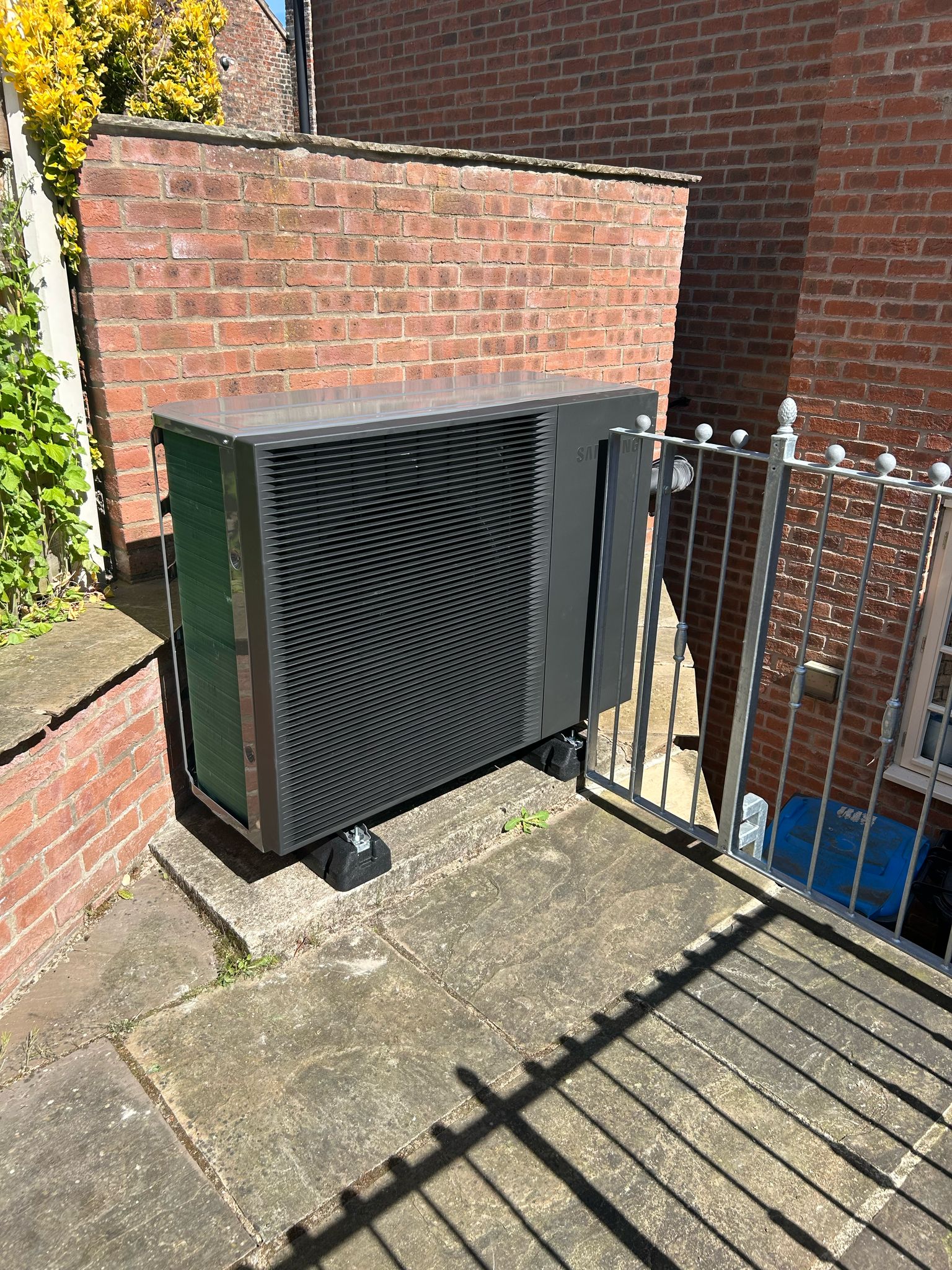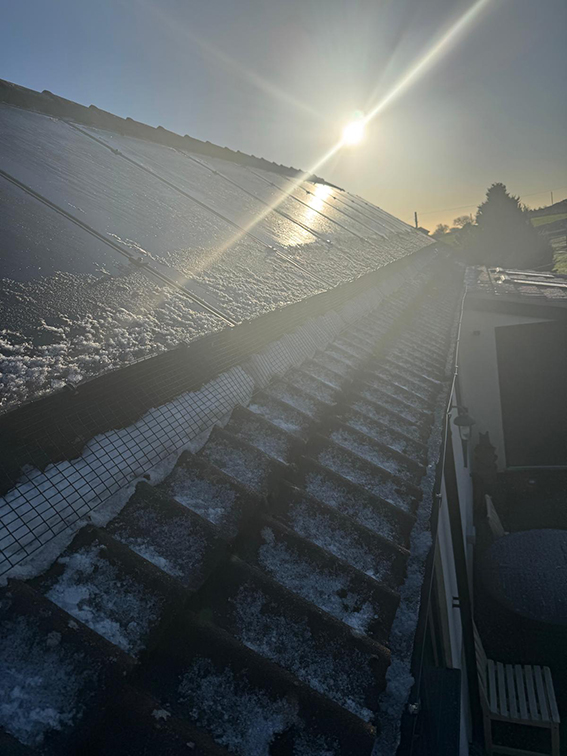
Government Grants for Heat Pumps in the UK (Updated 2025)
What Are Heat Pumps and Why Are They Important?
Heat pumps draw their energy from either water, air, or the ground and feed into central heating and water systems.
The most popular of the heart pumps is currently the air source heat pump, as these are the easiest and most efficient to fit.
Air source heat pumps take air from the outside and use it to heat water in heating pipes – much like gas does in your current boiler.
It helps to think of them as kind of a reverse air conditioner.
Overview of Government Support for Heat Pumps in 2025
There is more than one scheme available for ASHPs, as most grants or loans cover ‘renewable energy’ or ‘home improvements.
But one that is specifically for your heating is the BUS, or Boiler Upgrade Scheme.
The Boiler Upgrade Scheme (BUS): 2025 Update
The Boiler Upgrade Scheme is designed to allow people to replace their old fossil fuel boilers with a heat pump.
Available to households in England and Wales, it means you can get up to £7,500 towrads your installation.
Also included in the £7500 bracket are water and ground source heat pumps.
If you opt for a biomass boiler you can claim £5,000 off the cost and installation.
You don’t have to worry too much about paperwork either as the installer will take care of the grant and deduct it from your bill.
The Boiler Upgrade Scheme is available for home and small business properties owners in England and Wales.
Who is eligible for the BUS grant?
First, you have to own your own property – that can be a domestic dwelling (house to the rest of us) or a commercial property/business.
You have to be using a fossil fuel system at the moment.
Make sure you have an EPC rating that was assessed in the last 10 years.
Your property must have a maximum installation capacity up to 45 kWth (kilowatt-thermal).
Kilowatt-thermal is a unit that measures the potential heat output of a heating system and your installer will assess this when visiting your property.
That installer must be certified by the Microgeneration Certification Scheme (MCS) AND be a Renewable Energy Consumer Code (RECC) or HIES Consumer Code member.
Unfortunately, new build properties aren’t generally able to apply for the Boiler Upgrade Scheme.
That said, if the property has an inefficient fossil fuel boiler that was fitted before you moved in, you many still be able to take advantage of the BUS grant.
The BUS grant isn’t available in Scotland or Northern Ireland at the moment, but you can still find other grants to help you out.
Energy Company Obligation (ECO)
Commonly known as ECO4, this government scheme will be running until 2026.
ECO4 is open to anyone who:
· Owns their own home and claims certain benefits.
· Claims Universal Credit
· Claims Pension Guarantee Credit
· Claims Pension Savings Credit
· Claims Income Support
· Claims Income-based Jobseeker’s Allowance (JSA)
· Claims Income-related Employment and Support Allowance (ESA)
· Claims Child Benefit
· Claims Housing Benefit
· Lives in social housing
And you will be able to claim if you are looking to:
· Get loft or cavity wall insulation.
· Are upgrading to your heating
· Want to install PV.
Any home looking to be considered must have an energy efficiency rating, or EPC, of D, E, F or G.
You can also get help if you rent from a private landlord, but the property must have an EPC of E, F or G and you must have the owner’s permission to do the work.
To apply to for the ECO4, contact your local council to find out if they’re taking part in the Energy Company Obligation scheme or contact an energy supplier directly.
You can find contact details of suppliers who are taking part in the scheme on the Ofgem website ... one of them is UK Energi!
Home Energy Scotland Grant and Loan Scheme
With this scheme, homeowners in Scotland can get access to a grant, interest free loan or a combination of both to install energy efficiency measures or renewable heating.
Heat pumps are eligible for grant funding of up to £7,500 with an additional £7,500 available as an interest free loan.
Insulation grant funding is available up to 75% of the combined cost up to a maximum t of £7,500.
Again, you can top this up with an interest free loan.
If you live up in the far reaches of the highlands, on of Scotland beautiful islands, or are just in a very remote place, an uplift of £1,500 is available.
How to Apply for a Heat Pump Grant in the UK
That’s all done for you!
Basically, you just need to ensure the installer you choose is MCS registered, and you can find a list of eligible installers here.
From there, the installer will confirm you are eligible and apply to Ofgem on your behalf.
They will then knock the value of the grant off the final invoice.
Are Heat Pumps Worth It in 2025?
Yes, absolutely, if your home is suitable.
We won’t claim that ASHPs are cheaper to run than gas boilers BUT we can tell you they are way more efficient.
An air source heat pump will produce 400% of the energy you put in – meaning for every kWh of electricity you use, you’ll get 4 kW of heat.
So, they are much greener than gas boilers.
Common Pitfalls and How to Avoid Them
The installer should thoroughly check your home to ensure it’s suitable for an air source heat pump, but just to be sure ask them:
· To explain the sizing of you heat pump to ensure its correct.
· What they tested to ensure your home is compatible.
· If your insulation is up to scratch.
· Is the system calibration correct.
Conclusion
Our conclusion is: ASHP grants are so easy to qualify for, and the installers do all the hard work, why wouldn’t you get one?
Well, the answer to that can only be ‘Our home is too old/draughty/listed to be suitable for an air source heat pump.’
If that’s not the case with your home then an air source heat pump can only improve your energy consumption, reduce your carbon footprint and futureproof your home for years to come.

